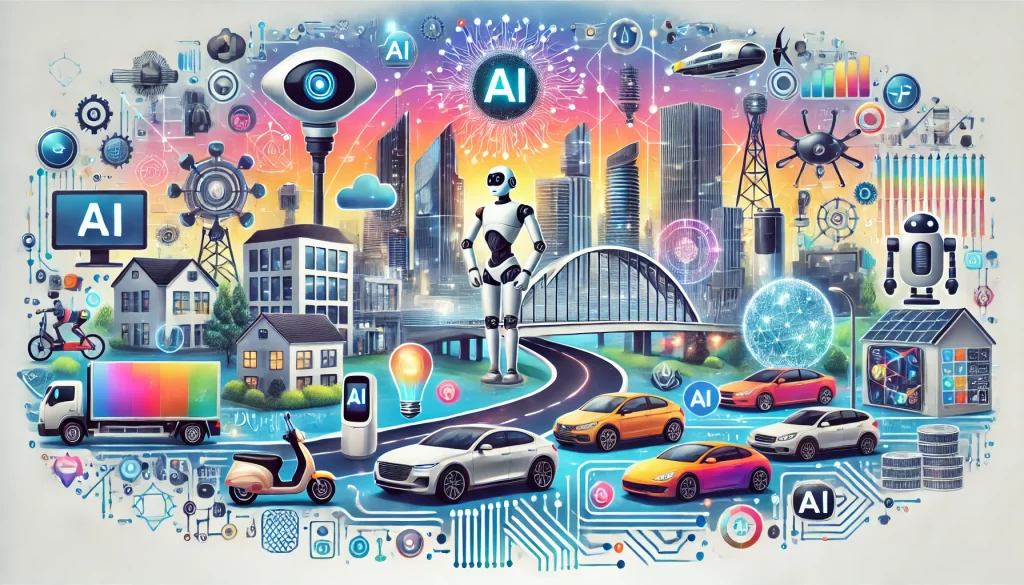Artificial Intelligence (AI) – The game-changing technology of the 21st century, revolutionising industries, solving complex challenges and harnessing unexplored potential in every field. The ACCELERATING development of AI has create interest in Startups that use AI to shake up traditional business models. If you are also an aspiring entrepreneur or planning to start your own based AI startup, then this article will show you 20+ AI startup ideas based on different industries, as well as actionable insights on how to implement them.
1. Healthcare AI Startups
Healthcare is one of the most promising sectors for AI innovation due to its potential to improve patient outcomes, reduce costs, and streamline operations.
a. AI-Powered Diagnosis Tools
Create an AI system that analyzes medical images, such as X-rays, MRIs, or CT scans, to detect diseases like cancer, heart conditions, or neurological disorders with high accuracy. Such a system could assist doctors in early diagnosis, potentially saving lives.
b. Personalized Medicine
Develop an AI platform that tailors treatment plans based on a patient’s genetic profile, medical history, and lifestyle. This can revolutionize how chronic illnesses like diabetes or heart disease are managed.
c. Virtual Health Assistants
Build a chatbot that uses natural language processing (NLP) to provide instant health advice, medication reminders, or answer basic health questions. Integrate it with telemedicine platforms for seamless patient care.
d. AI-Driven Drug Discovery
Design an AI model that accelerates drug development by predicting molecular interactions and identifying potential candidates for new treatments. Partner with pharmaceutical companies to commercialize discoveries.
2. Education AI Startups
AI has the potential to revolutionize education by personalizing learning experiences and making knowledge accessible to all.
a. Adaptive Learning Platforms
Create an AI-powered learning platform that identifies a student’s strengths and weaknesses and tailors content to their learning pace and style.
b. Automated Grading Systems
Develop a tool that evaluates essays, coding assignments, or multiple-choice questions, freeing up educators’ time and ensuring consistent grading.
c. Language Learning AI
Build an AI tutor that uses speech recognition and conversational AI to help users learn new languages interactively.
d. Career Counseling AI
Offer a career guidance platform that analyzes students’ skills, interests, and market trends to suggest career paths and learning opportunities.
3. E-Commerce and Retail AI Startups
AI can redefine how consumers shop, improving personalization and operational efficiency.
a. Virtual Shopping Assistants
Develop an AI assistant that helps users find products, make recommendations, and answer queries, mimicking the in-store shopping experience.
b. Predictive Inventory Management
Create a system that uses AI to forecast demand for products, reducing overstock and stockouts for retailers.
c. AI-Powered Visual Search
Enable users to search for products by uploading photos. For example, a shopper could upload a picture of a dress they like, and your AI would find similar items across online stores.
d. Sentiment Analysis for Product Reviews
Build an AI tool that analyzes customer reviews to determine product strengths and weaknesses, helping businesses improve their offerings.
4. Finance and FinTech AI Startups
AI is transforming the finance industry by enhancing decision-making, fraud detection, and customer experience.
a. Fraud Detection Systems
Develop an AI platform that detects unusual patterns in financial transactions to flag potential fraud in real-time.
b. Robo-Advisors for Investment
Create an AI-driven investment advisor that provides personalized investment strategies based on user risk profiles and market trends.
c. Credit Scoring Models
Design an AI tool that evaluates creditworthiness using alternative data, such as social behavior or payment history, to make lending decisions more inclusive.
d. Expense Management Chatbots
Offer a chatbot that helps users track their expenses, categorize spending, and provide financial advice based on their habits.
5. Transportation and Logistics AI Startups
AI plays a crucial role in optimizing transportation networks and supply chain logistics.
a. Autonomous Delivery Drones
Build an AI-powered drone system for last-mile delivery in urban or remote areas, reducing delivery costs and time.
b. Route Optimization Tools
Create an AI platform for logistics companies that suggests optimal delivery routes, saving fuel and improving efficiency.
c. Predictive Maintenance
Develop an AI tool that analyzes data from vehicles or machinery to predict maintenance needs, reducing downtime and repair costs.
d. Smart Traffic Management
Design an AI system that monitors and manages traffic flow in real-time, minimizing congestion and enhancing road safety.
6. Real Estate and PropTech AI Startups
The real estate sector is ripe for AI-driven transformation, from property searches to management.
a. AI Property Valuation
Develop a platform that uses AI to provide accurate property valuations by analyzing location data, market trends, and property features.
b. Virtual Property Tours
Offer AI-generated virtual property tours that allow prospective buyers to explore homes remotely.
c. Tenant Screening Tools
Create an AI service that evaluates tenant applications based on credit history, employment, and other factors, streamlining the rental process.
d. Smart Building Management
Build an AI system that monitors energy usage, security, and maintenance needs in real-time for property managers.
7. Creative AI Startups
AI has opened up new avenues for creativity, assisting artists, writers, and designers.
a. Content Generation Platforms
Create an AI tool that writes blog posts, scripts, or marketing copy tailored to user requirements.
b. Music Composition AI
Develop an AI platform that generates music tracks based on user preferences or emotional tones.
c. AI for Graphic Design
Offer a service where users can input design briefs, and AI generates logos, banners, or other visual content.
d. Video Editing AI
Build an AI-powered video editing tool that automates tasks like cutting clips, adding subtitles, and enhancing quality.
8. Sustainability and Green Tech AI Startups
AI can help address pressing environmental issues and promote sustainable practices.
a. Renewable Energy Optimization
Develop an AI system that predicts energy demand and optimizes the distribution of renewable energy resources.
b. AI for Waste Management
Create a platform that identifies recyclable materials from waste streams using computer vision and robotics.
c. Smart Agriculture Tools
Build an AI solution for farmers that provides insights on crop health, irrigation needs, and pest control, improving yields while conserving resources.
d. Carbon Footprint Trackers
Offer an AI-powered app that calculates and helps reduce users’ carbon footprints through actionable suggestions.
9. Security and Cybersecurity AI Startups
With increasing digital threats, AI-powered security solutions are in high demand.
a. AI Threat Detection
Create an AI tool that detects and mitigates cyber threats by analyzing patterns in network traffic.
b. Identity Verification Systems
Build an AI platform that uses facial recognition and biometric data to verify identities for secure transactions.
c. Phishing Prevention Tools
Develop an AI system that identifies and blocks phishing emails before they reach users’ inboxes.
d. Smart Surveillance Systems
Offer an AI-powered surveillance system that detects unusual activities in real-time, enhancing public safety.
10. Social and Lifestyle AI Startups
AI is increasingly being integrated into personal and social applications to enhance daily life.
a. Personal Productivity Assistants
Create an AI assistant that schedules tasks, organizes emails, and prioritizes activities to improve productivity.
b. Mental Health Chatbots
Develop an AI-powered mental health platform that provides guided meditation, mood tracking, and support for common mental health issues.
c. AI Matchmaking Services
Build an AI system that analyzes users’ preferences, interests, and values to suggest compatible matches on dating platforms.
d. Smart Home Integrations
Offer AI solutions that integrate and manage smart home devices, from lighting to security, through a unified interface.
How to Start an AI Startup
1. Identify a Niche Problem
Choose a specific problem that can be solved effectively with AI. Research your target market to validate demand.
2. Build or Partner for Technical Expertise
If you’re not a technical expert, partner with AI developers or data scientists to bring your idea to life.
3. Leverage Existing AI Tools
Use frameworks like TensorFlow, PyTorch, or OpenAI’s APIs to accelerate development and reduce costs.
4. Secure Funding
AI startups often require significant computational resources. Look for investors, grants, or accelerators to support your venture.
5. Focus on Ethical AI
Ensure your AI solutions are transparent, unbiased, and respectful of user privacy to gain trust.
6. Iterate and Improve
Use user feedback and data insights to refine your AI model and expand your offering.
Scaling and Marketing Your AI Startup
After identifying a niche and developing an AI-powered product, the next step involves scaling your startup and reaching a wider audience. Scaling effectively requires a strategic approach to marketing, partnerships, and product improvement. Here’s how to do it:
1. Scaling Your AI Startup
a. Leverage Cloud Computing
Cloud platforms like AWS, Google Cloud, and Microsoft Azure offer scalable AI services. These platforms enable you to handle large datasets and train complex models without maintaining expensive hardware.
b. Automate Repetitive Tasks
AI startups can use their own technology to streamline operations, such as automating customer support with chatbots or optimizing workflows with predictive analytics.
c. Partnerships with Established Companies
Collaborating with established businesses can help validate your product, access broader markets, and secure funding. For example, an AI healthcare startup might partner with hospitals to deploy its diagnostic tools.
d. Focus on Customer Feedback
Listening to user feedback is critical for refining your product and ensuring it meets market demands. Use AI-powered tools to collect, analyze, and act on customer insights.
e. Expand Globally
AI products often transcend geographical boundaries. Offer multilingual support and adapt your solutions to meet the cultural and legal requirements of different regions.
2. Marketing Strategies for AI Startups
a. Educate Your Audience
AI can be complex, so educating potential users is key. Create content like blogs, webinars, and videos to explain your product’s benefits in layman’s terms.
b. Highlight Use Cases
Case studies and success stories are powerful tools for showcasing how your product solves real-world problems. For example, demonstrate how your AI tool helped reduce costs or improve efficiency for a client.
c. Offer Free Trials or Freemium Models
Letting users experience your AI product firsthand is an excellent way to convert leads into paying customers. Provide free trials or a freemium version to encourage adoption.
d. Leverage Social Media and SEO
Use social media platforms and SEO strategies to target your audience effectively. Sharing AI-related content, infographics, and success stories can increase your visibility.
e. Participate in AI Events
AI expos, hackathons, and tech conferences provide opportunities to showcase your startup, network with industry leaders, and attract potential investors.
Challenges and How to Overcome Them
Launching and growing an AI startup is not without challenges. Here are some common obstacles and strategies to overcome them:
1. Access to High-Quality Data
AI systems require vast amounts of data to function effectively. Accessing high-quality, diverse, and unbiased datasets can be a hurdle.
- Solution: Use open datasets available from platforms like Kaggle or government sources. Partner with organizations that can share anonymized data.
2. Regulatory and Ethical Concerns
AI startups often face scrutiny regarding data privacy, algorithmic bias, and ethical practices.
- Solution: Adopt transparent practices, comply with local regulations like GDPR or HIPAA, and implement fairness in AI algorithms.
3. Talent Acquisition
Hiring experienced AI professionals can be challenging due to the competitive market.
- Solution: Offer remote work options to tap into global talent pools. Provide training opportunities for promising candidates to develop AI expertise.
4. Computational Costs
Developing and deploying AI models require substantial computing resources, which can strain budgets.
- Solution: Start small with pre-trained models or use cost-effective cloud computing services. Optimize algorithms to minimize resource consumption.
5. Market Competition
With the rapid growth of AI startups, standing out in the market can be difficult.
- Solution: Focus on niche markets and offer unique value propositions that competitors can’t easily replicate.
Future Trends in AI Startups
1. Generative AI Applications
Generative AI, such as OpenAI’s GPT or DALL-E, has opened doors for startups in content creation, design, and virtual environments. Future applications might include AI-generated virtual influencers, storytelling tools, and game development platforms.
2. AI and Blockchain Integration
Combining AI with blockchain technology offers potential in creating secure, decentralized applications, such as identity verification systems or transparent supply chain solutions.
3. Edge AI
Edge computing enables AI algorithms to run on local devices rather than centralized servers. Startups focusing on edge AI can develop products like smart cameras, wearables, or IoT devices that function efficiently without continuous internet connectivity.
4. Explainable AI (XAI)
As businesses demand more transparency from AI systems, startups focusing on explainable AI will have an edge. These systems offer insights into how decisions are made, building trust with users and regulators.
5. AI for Aging Populations
With aging populations worldwide, startups addressing elder care with AI-powered solutions like fall detection systems, robotic caregivers, or health monitoring devices will find growing markets.
FAQs on AI Startup Ideas
1. What are the top industries for AI startups?
AI startups are thriving in healthcare, education, e-commerce, finance, transportation, real estate, creative industries, sustainability, security, and lifestyle sectors. Each industry offers unique opportunities for innovation and growth.
2. Do I need to be an AI expert to start an AI company?
No, but having a basic understanding of AI principles is helpful. You can partner with AI experts, hire data scientists, or use pre-built AI tools and APIs to bring your ideas to life.
3. How much funding does an AI startup need?
The funding requirements depend on the complexity of your product and its computational needs. Early-stage AI startups often require between $50,000 and $500,000 for development and initial operations.
4. What tools can help me start my AI startup?
Popular tools and platforms include:
- Frameworks: TensorFlow, PyTorch
- APIs: OpenAI, IBM Watson
- Cloud Services: AWS, Google Cloud, Microsoft Azure
- Dataset Providers: Kaggle, UCI Machine Learning Repository
5. How can I differentiate my AI startup from competitors?
Focus on solving niche problems, provide exceptional user experience, and ensure your AI model is explainable, unbiased, and aligned with customer needs.
6. What are the ethical concerns in AI startups?
Ethical concerns include data privacy, algorithmic bias, and misuse of AI. Address these by implementing transparency, securing user data, and ensuring fairness in your algorithms.
7. How can AI startups generate revenue?
AI startups can generate revenue through:
- Subscriptions: Offering SaaS-based AI tools
- Licensing: Selling AI algorithms to businesses
- Custom Solutions: Building tailored AI systems for clients
- Freemium Models: Upselling advanced features to free users
8. What are some low-cost AI startup ideas?
- Chatbots for small businesses
- AI tools for social media content generation
- Personal finance management apps
- AI-powered language tutors
- Smart home management solutions
9. How do I find investors for my AI startup?
Network with venture capitalists, apply to AI-focused accelerators, attend tech events, and use platforms like AngelList to connect with potential investors.
10. What’s the future of AI startups?
The future of AI startups lies in areas like generative AI, edge computing, personalized medicine, autonomous systems, and AI for sustainability. As AI technology matures, startups focusing on ethical, transparent, and innovative solutions will thrive.
With AI continuing to redefine industries, now is the perfect time to dive into the exciting world of AI entrepreneurship. Whether you’re developing tools for healthcare, creating virtual assistants, or building smarter systems for everyday life, the opportunities are vast and waiting for innovators like you.
Final Thoughts
AI is a fast-changing space with significant potential to transform sectors and enable better human outcomes. This is no matter if you are interested in creating a new startup in the fields of healthcare, sustainability, education, or another domain — the possibilities for AI startups are practically endless. The trick is marrying technical innovation with practical applications that solve real problems. By prioritizing creativity, execution, and ethics, your AI startup can not only thrive but also make a meaningful impact on society.


